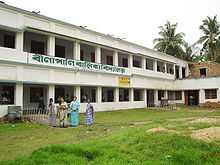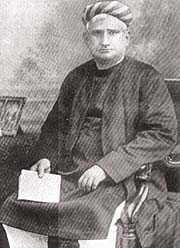Berachampa
| Berachampa | |
|---|---|
| town | |
 Berachampa Location in West Bengal, India | |
| Coordinates: 22°43′N 88°29′E / 22.72°N 88.48°ECoordinates: 22°43′N 88°29′E / 22.72°N 88.48°E | |
| Country |
|
| State | West Bengal |
| District | North 24 Parganas |
| Government | |
| • Block Development Officer | Mr. Manobendro Das |
| • MP | Kakali Ghosh Dastidar |
| • MLA | Dr. M. Nuruzzaman |
| Area | |
| • Total | 46.54 km2 (17.97 sq mi) |
| Elevation | 10 m (30 ft) |
| Population (2001) | |
| • Total | 17,873 |
| • Density | 384/km2 (990/sq mi) |
| Languages | |
| • Official | Bengali, English |
| Time zone | IST (UTC+5:30) |
| PIN | 743424 |
| Telephone code | 91 3216 |
| Vehicle registration | WB24 |
| Website |
north24parganas |
Berachampa (Bengali: বেড়াচাঁপা, pronounced as: Be-ra-cha-pa) is a small town on the outskirts of Kolkata, West Bengal, in eastern India. The town is roughly between the towns of Barasat and Basirhat, approximately 34 kilometres (21 miles) from Kolkata.
The town is a trade center for goods such as rice, legumes, Jute, sugar cane, potatoes and coconuts. This town is also famous for business of live stocks. Cotton weaving and Jute Marketing is common in Berachampa, along with metalworking. Near Berachampa, there is the ancient archaeological site of Chandraketugarh, circa 300 BC.
Many busy roads pass close to or through the town; State Highway 2 (SH2) and the Taki road (which connects Barasat and Basirhat) both pass through Berachampa. Haroa Road (connecting Berachampa and Newtown), Prithiba Road and Baduria Road (connecting Berachampa with Baduria) are other important roads.
History
Near Berachampa, there is the archeological site of Chandraketugarh, thought to be a part of the ancient kingdom Gangaridai that was first described by Ptolemy. The history of Chandraketugarh dates back to almost the 3rd century BC, during the pre-Mauryan era. Artefacts suggest that the site was continuously inhabited and flourished through the Sunga-Kushana period, onwards through the Gupta period and finally into the Pala-Sena period. Archaeological studies suggest that Chandraketugarh was an important town and a port city. It had a high encircling wall complete with a rampart and moat. The residents were involved in various crafts and mercantile activities. Although the religious inclinations of the people are unclear, hints of the beginning of some future cults can be seen in the artefacts. Some of the potteries carry inscriptions in Kharoshthi and Brahmi scripts.
| Period | Dynasty | Year |
|---|---|---|
| Period I | Maurya | 300-200 BC |
| Period III | Sunga | 200 BC - 50 AD |
| Period IV | Kushan | 50-300 AD |
| Period V | Gupta | 300-500 AD |
| Period VI | Post-Gupta | 500-750 AD |
| Period VII | Pala-Chandra-Sena | 750-1250 AD |
After these periods, there was no such example of any other civilization on the ruin of Chandraketugarh. Anyway the history of Berachampa was same as the History of Bengal. The Deva Kingdom, Ilyas Shahi dynasty, Ganesha dynasty and Hussain Shahi dynasty ruled this region finally before Mughal Period started.
Chandraketugarh features many examples of terracotta art, displaying an unusual degree of precision and craftsmanship. These plaques are comparable to those found at other better-known sites such as Kaushambi and Ahichhatra. The terracotta plaques from these sites often carry similar motifs executed in nearly identical fashion. This similarity suggests an established communication link and common cultural heritage among these sites.
A large number of silver punch-marked coins and a few gold coins have been unearthed from Chandraketugarh, including a gold coin of Chandragupta-Kumardevi. A large number of semi-precious stone beads were also found here, along with items made of ivory and bone. Even a few wooden objects have survived.
Geography
Berachampa is located at 22°43'N 88°29'E. Berachampa is located in the Ganges Brahmaputra delta region in the district of North 24 Parganas, West Bengal state in eastern India. The Bangladesh border at Petrapole is situated about 60 km (37 mi) from the city. The average elevation is 10 metres (33 ft), and no notable river flows by the city. The nearest river is the Ganges itself, which lies about 30 km (19 mi) to the west. The city is on the Gangetic plain, lacking any hills.
Climate
The climate is tropical, like the rest of West Bengal. A notable weather feature is the Monsoon season, which runs from early June to mid-September. The weather remains dry during the winter (mid-November to mid-February) and humid during summer. Typical temperature variations would be from 41 °C (106 °F) in May (high), to 10 °C (50 °F) in January (low). Relative humidity fluctuates between an average of 50% in March up to 96% in July.
Economy

Cotton weaving is the major industry in Berachampa; it is also an important trade center for goods such as rice, legumes, jute, sugar cane, potatoes and coconuts. Many small industries can be found in and around the town, especially metalworking factories. Retail is a major source of income for the town, with the main market located near Taki Road.
Farming is a vital occupation in Berachampa. The presence of many leading banks (State Bank of India, United Bank of India, Allahabad Bank, Axis Bank, etc.) and Life Insurance Corporation of India (LICI) offices also provide employment.
Politics
Berachampa is a part of the Barasat (Lok Sabha constituency) and the Deganga (Vidhan Sabha constituency).
Transport
Roads
Berachampa can be reached from Kolkata via V.I.P Road (Najrul Islam Sarani), Jessore Road (National Highway 34) and Taki Road.
Berachampa contains a major road junction, connecting the following roads:
- The Taki Road (SH 35), which leads to Taki, and ultimately to the Bangladesh border.
- The Haroa Road, which leads to New Town via Haroa
- Megacity Road.
- Prithiba Road, which leads to Prithiba near Ashoknagar.
- Baduria Road, which leads to Baduria.
Buses
Bus services are available to the following destinations:
- Towards Kolkata: Dharmatala, Shealdah, Dakshineswar, Shyambazar etc.
- Heading South: Digha, Sundarban, Haroa etc.
- Heading North: Durgapur, Balurghat, Baharampur, Kalyani etc.
- Heading East: Baduria, Itindaghat, Bashirhat, Hasnabad, Taki etc.
- Heading West: Howrah, Gadiara etc.
- International Volvo Bus Services towards Dacca (Bangladesh) and Timpu (Bhutan).
Rail
The nearest rail station is Haroa Road, which is attached to the Shealdah-Hasnabad Section of Eastern Railway. The Barasat-Basirhat Railway line was originally run by Martin's Light Railways, but is now run as a section of Sealdah division of Eastern Railways.
Air
Dumdum Airport (Netaji Subhash Chandra Bose International Airport) is 20 kilometres (12.4 miles) from Berachampa.
Transport within the city
Most public transport within the city relies on cycle-rickshaws, and three-wheeled man-driven "cycle-vans". Auto rickshaws operate between Berachampa and nearby areas like Barasat, Kalitala, and Haroa.
Culture
The culture of Berachampa is similar to other small towns in Bengal, with examples of drama, recitation, classical music, songs and dances. Basanti puja is very famous in Berachampa. Basanti Devi is a Durga-like ten handed Hindu goddess. Debalaya Bhatri Sangha is the oldest club of Berachampa who organised Basanti Puja first. Deganga Book Fair is one of the most important book fairs of North 24 Parganas.
Education
The town's schools are run either by the state government or by private organisations. Teaching is usually in either English or Bengali. The schools are affiliated with the Indian Certificate of Secondary Education (ICSE), the Central Board for Secondary Education (CBSE), or the West Bengal Board of Secondary Education. Under the 10+2+3 plan, after completing their secondary education, students typically enrol in a junior college (also known as a pre-university) or in schools with a higher secondary facility affiliated with West Bengal Council of Higher Secondary Education, for 2 years. Students usually choose from one of three streams — liberal arts, commerce, or science, though vocational streams are also available. Upon completing the required coursework, students may enrol in general or professional degree programmes.
Schools

- Berachampa Deulia Uchcha Vidyalaya
- Binapani Balika Vidyalaya
- Hadipur Adorsho Vidyalaya
- Deganga Karthikpur Adorsho Vidyapith
- Eajpur High Madrasah
Colleges and universities
Colleges:
- Acharya Jagadish Chandra Bose Polytechnic College
- Chandraketugarh Sahidullah Smriti Mahavidyalaya
- Adamas Institute of Technology, an Engineering College under the aegis of RICE GROUP, affiliated to West Bengal University of Technology and approved by AICTE.
- Rahmat-E-Alam Mission, a modern Educational Institute, visit- www.rahmat-e-alammission.org
Universities:
Media
The media in Berachampa tends to be dominated by that of Kolkata. Bengali language newspapers like Anandabazar Patrika, Aajkaal, Bartaman, Sangbad Pratidin, and Ganashakti are widely circulated. Regional and national English newspapers such as The Telegraph, The Statesman, Asian Age, Hindustan Times and The Times of India are available. Kolkata's radio stations are available here. Local FM radio stations include: AIR Kolkata (FM Rainbow & FM Gold), Radio Mirchi, Red FM, Aamar FM, Gyan Vani, Fever FM, Radio One, Oye FM, BIG FM and Power FM. The state-owned television broadcaster Doordarshan provides two free terrestrial channels, while MSO provides a mix of Bengali, Hindi, English and other regional channels via cable.
Sports
Football is the main sport in the town, though cricket is also popular. Traditional Indian sports like Kabbadi and kho-kho are also played.
An IFA-affiliated football coaching centre (Devalaya ambikanagar football coaching centre) is solely run by Biswanath mondal (locally known as "Lalu da"). From the beginning, his dream was to produce great footballers, who would hopefully go on to play for the Indian national team. He has been teaching football for 15 years, at no cost to students. Everyday practice takes place at AJC polytechnic college ground. Some football academies, such as TFA and SAIL, have visited the centre, scouting footballers for their academies. Some players, such as Hachibuddin Mondal, Mohidul Islam and Monirul Mondal, play for the Mohameddan sporting club.
Healthcare
Berachampa is one of the areas where ground water is affected by arsenic contamination.[1]
The North 24 Parganas District Hospital is located in Barasat. Berachampa also has several privately operated nursing homes and hospitals, such as the United Nursing Home, Janoseva Nursing Home, and Sundarban Nursing Home, along with an ayurvedic pharmaceuticals company PROTON HERBAL PVT LTD, Website www.protongroup.co.in.
Notable people


- Warren Hestings, lived in Berachampa during the early 18th century.
- Bankim Chandra Chatterjee, the deputy magistrate of 24 Parganas in the 19th century.
- Peary Charan Sarkar, notable scholar, was headmaster of Barasat Government High School.
- Dr. Shahidullah, a linguist and novelist, lived in Berachampa.
See also
References
- ↑ "Groundwater Arsenic contamination in West Bengal-India (19 years study )". Groundwater arsenic contamination status of North 24-Parganas district, one of the nine arsenic affected districts of West Bengal-India. SOES. Retrieved 2007-08-24.
External links
| Wikimedia Commons has media related to Berachampa. |
| ||||||||||||||